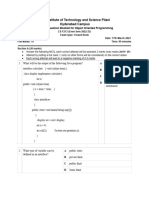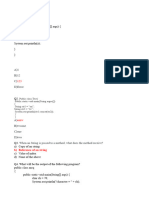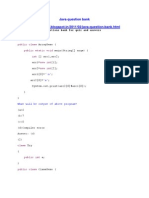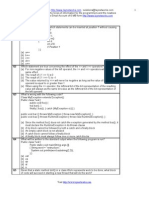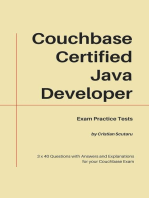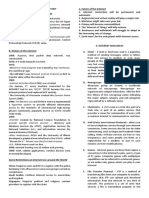RPSC Programmer Java DPP Part-4 By-Sunil Yadav Sir
RPSC Programmer Java DPP Part-4 By-Sunil Yadav Sir
Uploaded by
1994niranjan1109Copyright:
Available Formats
RPSC Programmer Java DPP Part-4 By-Sunil Yadav Sir
RPSC Programmer Java DPP Part-4 By-Sunil Yadav Sir
Uploaded by
1994niranjan1109Original Title
Copyright
Available Formats
Share this document
Did you find this document useful?
Is this content inappropriate?
Copyright:
Available Formats
RPSC Programmer Java DPP Part-4 By-Sunil Yadav Sir
RPSC Programmer Java DPP Part-4 By-Sunil Yadav Sir
Uploaded by
1994niranjan1109Copyright:
Available Formats
RPSC Programmer JAVA DPP Part-4 BY-SUNIL YADAV SIR 1
JAVA DPP Part - 4
final class Bus{
Q 1. What is the output of the below Java
program using Inheritance? void show() {
class A System.out.print("Generic Bus. "); }}
{
void call() class ElectricBus extends Bus{
{
void show(){
System.out.println("super called ");
} System.out.println("Electric Bus. "); }}
}
public class Inheritance4 {
class B extends A
{ public static void main(String[] args) {
void display()
{ ElectricBus eb = new ElectricBus();
System.out.println("sub called ");
eb.show();} }
}
} (a) Generic Bus (b) Electric Bus
class Main
(c)Generic Bus. Electric Bus.
{
public static void main(String a[]){ (d) Compiler error
A obj=new B();
obj.display(); Q 4. In a Multi-Level Inheritance in Java, the last
} subclass inheritsmethods and properties of ____.
} (a) Only one immediate Superclass
(a) super called (b) sub called (b) Few classes above it.
(c) All classes above it
(c)compilation error (d) None of the above
(d) runtime exception Q 5. What is the output of this program?
Q 2. To stop or block inheriting a given class, the class A
___ keyword is used before the class.
{
(a) Static (b) private
int i;
(c)final (d) None of the above
public void display() {
Q 3. What is the output of the below Java System.out.println(i); } }
program? class B extends A
Join RPSC Programmer Offline/Online Batch Contact @ 9694473047
RPSC Programmer JAVA DPP Part-4 BY-SUNIL YADAV SIR 2
{ int j; {
public void display() B obj = new B();
{System.out.println(j);} } obj.i=1;
class Dynamic_dispatch obj.j=2;
{ obj.display();
public static void main(String args[]) }}
{ (a) 1 2 (b) 2 1
B obj2 = new B(); (c)1 3 (d) 3 1
obj2.i = 1; Q 7. What is the output of this program?
obj2.j = 2; class Alligator
A r; {
r = obj2; public static void main(String[] args)
r.display(); } } {
(a) 1 (b) 2 int []x[] = {{1,2}, {3,4,5}, {6,7,8,9}};
(c)compilation error (d) 3 int [][]y = x;
Q 6. What is the output of this program? System.out.println(y[2][1]);
class A }}
{ public int i; (a) 2 (b) 3
protected int j;} (c)7 (d) Compilation Error
class B extends A
Q 8. Using which of the following, multiple
{ int j;
inheritance in Java can be implemented?
void display() {
(a) Interfaces (b) Multithreading
super.j = 3;
(c)Protected methods (d)Private methods
System.out.println(i + " " + j) }}
class Output {
public static void main(String args[])
Join RPSC Programmer Offline/Online Batch Contact @ 9694473047
RPSC Programmer JAVA DPP Part-4 BY-SUNIL YADAV SIR 3
Q 9. All classes in Java are inherited from which {
class?
System.out.print("Hello" + " " + 1 / 0);
(a) java.lang.class
}
(b) java.class.inherited
(c) java.class.object catch(ArithmeticException e)
(d) java.lang.Object
{
Q 10. In order to restrict a variable of a class
from inheriting to subclass, how variable should System.out.print("World");
be declared?
}}}
(a) Protected (b) Private
(a) Hello (b) World
(c)Public (d) Static
(c)HelloWorld (d) Hello World
Q 11. Which of the following is used for
Q 15. Which of the following handles the
implementing inheritance through an interface?
exception when a catch is not used?
(a) Inherited (b) using
(a) finally (b) throw handler
(c)extends (d) implements
(c)default handler (d) java run time system
Q 12. Which of the following operators is used
Q 16. Which of the following should be true of
to generate instance of an exception which can
the object thrown by a thrown statement?
be thrown using throw?
(a) Should be assignable to String type
(a) thrown (b) alloc
(b) Should be assignable to Exception type
(c)malloc (d)new (c) Should be assignable to Throwable type
(d) Should be assignable to Error type
Q 13Which of the following is a super class of all
exception type classes? Q 17. What is the output of this program?
(a) Catchable (b) RuntimeExceptions class exception_handling
(c)String (d) Throwable {
Q 14. What is the output of this program? public static void main(String args[])
class exception_handling {
{ try
public static void main(String args[]) {
{ throw new NullPointerException ("Hello");
try }
Join RPSC Programmer Offline/Online Batch Contact @ 9694473047
RPSC Programmer JAVA DPP Part-4 BY-SUNIL YADAV SIR 4
catch(ArithmeticException e) {
{ System.out.print("World");
System.out.print("B"); }}}
}}} (a) Hello (b) World
(b) HelloWOrld (d) Compilation Error
(a) A (b) B
(c)Compilation Error
Q 20. Which of these methods return description
(d) Runtime Error
of an exception?
Q 18. Which of these statements is incorrect?
(a) getException()
(a) try block need not to be followed by (b) getMessage()
catch block (c) obtainDescription()
(b) try block can be followed by finally block (d) obtainException()
instead of catch block
(c) try can be followed by both catch and
finally block
(d) try need not to be followed by anything
Q 19What is the output of this program?
class Output
public static void main(String args[])
try
int a = 0;
int b = 5;
int c = a / b;
System.out.print("Hello");
catch(Exception e)
Join RPSC Programmer Offline/Online Batch Contact @ 9694473047
You might also like
- All Milestone MCQ PDFDocument75 pagesAll Milestone MCQ PDFSabari SabsterNo ratings yet
- SESTEK Voice BiometricsDocument9 pagesSESTEK Voice BiometricsHalil M. KuğuNo ratings yet
- Java Questions3Document6 pagesJava Questions3Belayneh TadesseNo ratings yet
- Java Pool - 75 QuestionsDocument46 pagesJava Pool - 75 QuestionsNimisha GuptaNo ratings yet
- Progress Test 2 - Key Spring20Document9 pagesProgress Test 2 - Key Spring20dihoc77No ratings yet
- Test 3Document11 pagesTest 3Jeet RajkumarNo ratings yet
- Classes and ObjectsDocument6 pagesClasses and ObjectsINDLA MAHESHNo ratings yet
- MCQ 50 QSDocument14 pagesMCQ 50 QSSumeet VermaNo ratings yet
- DXC - Java MCQs - 1-25Document13 pagesDXC - Java MCQs - 1-25Mahesh ChauhanNo ratings yet
- Day 2 QuizDocument7 pagesDay 2 QuizsureshNo ratings yet
- 23 MST CS F213 Solution KeyDocument13 pages23 MST CS F213 Solution Keyarination150No ratings yet
- Quiz - JAVA & OOP QuizDocument11 pagesQuiz - JAVA & OOP QuizDEEPAK KUMAR REDDY BHIMAVARAPUNo ratings yet
- Java CTS Dumps 3Document30 pagesJava CTS Dumps 3TRICKY MINDNo ratings yet
- Java MCQsDocument5 pagesJava MCQsgupta_ssrkm2747100% (1)
- Introduction To OOP and Java Language: - Is Java Completely Object Oriented?Document32 pagesIntroduction To OOP and Java Language: - Is Java Completely Object Oriented?Nihal BanajwadNo ratings yet
- OOPSDocument10 pagesOOPSsaieashu219No ratings yet
- Lab 6,7,8 ADocument4 pagesLab 6,7,8 AMalliNo ratings yet
- FALLSEM2019-20 STS4021 SS VL2019201000258 Reference Material I 11-Jul-2019 CAT1-4021-Integ-AS PDFDocument14 pagesFALLSEM2019-20 STS4021 SS VL2019201000258 Reference Material I 11-Jul-2019 CAT1-4021-Integ-AS PDFjahnavi rajuNo ratings yet
- Java MCQ Worksheet-10 MCQDocument5 pagesJava MCQ Worksheet-10 MCQRajitha Reddy AlugatiNo ratings yet
- MCQ Java QustionsDocument23 pagesMCQ Java QustionsmagalaxmiNo ratings yet
- Abstract, Inner, Static Classes Questions: Class Public PublicDocument7 pagesAbstract, Inner, Static Classes Questions: Class Public PublicChirag AhujaNo ratings yet
- Name - Hrythm R.No. - 1815689: Java MCQ Test - 25ques Coding Questions-2Document16 pagesName - Hrythm R.No. - 1815689: Java MCQ Test - 25ques Coding Questions-2Hrythm MunjalNo ratings yet
- Assignment 2-JavaDocument11 pagesAssignment 2-JavaHack ManiaNo ratings yet
- Class A (2. Int I 3. Void Display (4. System - Out.println (I) 5.) 6.) 7. Class B Extends A (8. Int JDocument3 pagesClass A (2. Int I 3. Void Display (4. System - Out.println (I) 5.) 6.) 7. Class B Extends A (8. Int JBelayneh TadesseNo ratings yet
- R.M.D Engineering College Department of Computer Science and Engineering Cs8383 Object Oriented Programming Laboratory Multiple Choice QuestionsDocument7 pagesR.M.D Engineering College Department of Computer Science and Engineering Cs8383 Object Oriented Programming Laboratory Multiple Choice QuestionsTamizharasi ArthanariNo ratings yet
- ET MCQ Practice QuestionsDocument53 pagesET MCQ Practice QuestionseclaudeeeeNo ratings yet
- Solution Manual - Electronic Devices and Circuit Theory 10th EditionDocument13 pagesSolution Manual - Electronic Devices and Circuit Theory 10th EditionArsalan WaheedNo ratings yet
- WT 200 MCQDocument26 pagesWT 200 MCQyoutubeNo ratings yet
- Java MCQ Unit 1Document16 pagesJava MCQ Unit 1Janvi JaniNo ratings yet
- Progress-Test1 K15Document9 pagesProgress-Test1 K15dihoc77No ratings yet
- Core Java Code SnippetsDocument11 pagesCore Java Code Snippetssus_jaliNo ratings yet
- OOP - Tieng AnhDocument114 pagesOOP - Tieng AnhVo Hoai NamNo ratings yet
- Practice Core Java and Advanced Java MCQsDocument13 pagesPractice Core Java and Advanced Java MCQsKaushik RaoNo ratings yet
- Java Fundamentals: X (X ) ? (Y+x) : (Y-X)Document19 pagesJava Fundamentals: X (X ) ? (Y+x) : (Y-X)rony royNo ratings yet
- Java Multiple Choice Questions and AnswersDocument34 pagesJava Multiple Choice Questions and AnswersmushayidominicNo ratings yet
- Java Que PaperDocument6 pagesJava Que PapershilpasanganbatteNo ratings yet
- Oops Unit-2Document83 pagesOops Unit-2Mathesh ParamasivamNo ratings yet
- Object Oriented Programming UsingDocument12 pagesObject Oriented Programming UsingJunaid khanNo ratings yet
- Java MCQDocument12 pagesJava MCQrony royNo ratings yet
- 4314 SuggestionsDocument4 pages4314 Suggestionsppandit2290No ratings yet
- ST 3 Practice QuestionsDocument30 pagesST 3 Practice QuestionseclaudeeeeNo ratings yet
- Java AssignmentDocument7 pagesJava AssignmentCorly AlikoNo ratings yet
- Module 4&5Document6 pagesModule 4&5nitinsaiginjupalliNo ratings yet
- Practice Set 1 With AnsDocument16 pagesPractice Set 1 With AnsPriyanshu UpadhyayNo ratings yet
- Java Questions 1: A. B. C. DDocument11 pagesJava Questions 1: A. B. C. Dzynofus technologyNo ratings yet
- Module2c AssessmentDocument3 pagesModule2c AssessmentsjctragsNo ratings yet
- Preguntas TipoDocument40 pagesPreguntas TipoBREINER ROISER CORREA ATUCSANo ratings yet
- OopsDocument42 pagesOopsMekalaRameshNo ratings yet
- Java MCQDocument13 pagesJava MCQrajNo ratings yet
- Java CTS Dumps 2Document28 pagesJava CTS Dumps 2TRICKY MINDNo ratings yet
- JAVA MCQ (Answers) - 5Document8 pagesJAVA MCQ (Answers) - 5Sri SriNo ratings yet
- Java Question BankDocument18 pagesJava Question BankkoolyogeshNo ratings yet
- OOP Final Model Paper 1st SemDocument14 pagesOOP Final Model Paper 1st SemhesarsdilshanNo ratings yet
- JCP MocksDocument146 pagesJCP MocksdknikeNo ratings yet
- Java MCQ byDocument23 pagesJava MCQ byhiteshNo ratings yet
- It 501 Object Technology & Uml: Multiple Choice QuestionsDocument4 pagesIt 501 Object Technology & Uml: Multiple Choice QuestionsMyWBUT - Home for EngineersNo ratings yet
- Java QuesDocument22 pagesJava Quesvighneshvg07No ratings yet
- Oops BankDocument10 pagesOops BankAshish SrivastavaNo ratings yet
- Part I. Multiple Choice Questions (3 Points Each)Document24 pagesPart I. Multiple Choice Questions (3 Points Each)محمد کاشف دھریجہNo ratings yet
- Dbms DPP Part 2 SolutionDocument22 pagesDbms DPP Part 2 Solution1994niranjan1109No ratings yet
- 23052023100240234093no Compassionate Appointment If Daughter-In-law of Deceased Govt Servant Is in Govt Job Circular Dt. 31 May 2016Document1 page23052023100240234093no Compassionate Appointment If Daughter-In-law of Deceased Govt Servant Is in Govt Job Circular Dt. 31 May 20161994niranjan1109No ratings yet
- 23052023095900924940application Before 4 Months of Getting 18 Years of Age Circular at 22 June 2015Document1 page23052023095900924940application Before 4 Months of Getting 18 Years of Age Circular at 22 June 20151994niranjan1109No ratings yet
- 1726071331Document56 pages17260713311994niranjan1109No ratings yet
- Why Projects FailDocument2 pagesWhy Projects FailEbo KoomsonNo ratings yet
- Tkuse Creo7000Document2,317 pagesTkuse Creo7000Gabriele MantaNo ratings yet
- Account GuideDocument94 pagesAccount Guidezezycv6919No ratings yet
- Power BI Beyond The Basics PublicDocument74 pagesPower BI Beyond The Basics Publicsharas77No ratings yet
- Quick Start: B450 Gaming Plus MaxDocument158 pagesQuick Start: B450 Gaming Plus MaxFábio MartinsNo ratings yet
- 1.3.1.6 Lab - Explore Social Engineering TechniquesDocument5 pages1.3.1.6 Lab - Explore Social Engineering Techniques1-Djan Jenaro AbeNo ratings yet
- Noise Channels Glitch and Error in Digital CultureDocument12 pagesNoise Channels Glitch and Error in Digital CultureSabrina MonteiroNo ratings yet
- SignaturesDocument18 pagesSignaturesJarot Kost-anNo ratings yet
- Installation SolidCAM 2010Document6 pagesInstallation SolidCAM 2010brian_inkNo ratings yet
- Cyberark Pas: Install and ConfigureDocument3 pagesCyberark Pas: Install and ConfigureAmitNo ratings yet
- Retail Academy - The App-OrtunityDocument49 pagesRetail Academy - The App-Ortunitydragos_oltean3418No ratings yet
- Syllubus For Data Networks and ProtocolsDocument2 pagesSyllubus For Data Networks and ProtocolsSELVAKUMAR RNo ratings yet
- JC Consulting Case Exercise - QBEDocument3 pagesJC Consulting Case Exercise - QBEOkezi AkpokeneNo ratings yet
- Wi-Fi Aware Specification v4.0Document257 pagesWi-Fi Aware Specification v4.0ehoNo ratings yet
- HPE OEM Windows Server Q117 Product Guide: Reseller Option KitDocument1 pageHPE OEM Windows Server Q117 Product Guide: Reseller Option Kitlwinnie14No ratings yet
- Template Manual Aeg Sd36 Enu Tu2.11 v1.002Document15 pagesTemplate Manual Aeg Sd36 Enu Tu2.11 v1.002anilv0972No ratings yet
- Tely Share 1402325537312Document1 pageTely Share 1402325537312Duong CaoNo ratings yet
- Programming C ProjectDocument38 pagesProgramming C ProjectMai LeNo ratings yet
- Getac S410 Spec SheetDocument2 pagesGetac S410 Spec SheetArunNo ratings yet
- Case Study: Rightnow Technologies/ Marketfirst: Rightnow in The Right Spot For Service and Customer ExperienceDocument8 pagesCase Study: Rightnow Technologies/ Marketfirst: Rightnow in The Right Spot For Service and Customer ExperienceHimank MayekarNo ratings yet
- Introduction To Cybercrime and Environmental Laws and ProtectionDocument10 pagesIntroduction To Cybercrime and Environmental Laws and ProtectionPrincess Lee GuialiNo ratings yet
- 1289oi sw342 2dv DVR4-2500 0809 PDFDocument44 pages1289oi sw342 2dv DVR4-2500 0809 PDFtvrepairzoneNo ratings yet
- Sample SCFT ReportDocument16 pagesSample SCFT ReportkashireddyNo ratings yet
- Canva TemplateDocument16 pagesCanva TemplateDebolina ChakravartyNo ratings yet
- Introduction To Internet NotesDocument7 pagesIntroduction To Internet NotesNatalie Jane PacificarNo ratings yet
- A Secured Mobile Cloud-Based House Rental Management System: April 2020Document18 pagesA Secured Mobile Cloud-Based House Rental Management System: April 2020AgathaNo ratings yet
- Spirit GeDocument109 pagesSpirit GeJose PonceNo ratings yet
- Arrithmatic Operations of 8051Document4 pagesArrithmatic Operations of 8051Smilly ShaikhNo ratings yet
- What Is SpamDocument9 pagesWhat Is SpamPradeep RaoNo ratings yet











